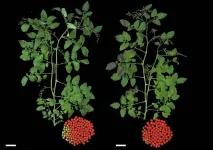(Press-News.org) A University of Exeter funding scheme designed to combat the global challenge of fungal antimicrobial resistance (fAMR) has announced a new call for applications.
The FAILSAFE project (Fungal AMR Innovations for LMICS: Solutions and Access For Everyone) is a groundbreaking initiative tackling antifungal drug resistance. The project aims to promote worldwide innovations to tackle the global health threat of fungal infections in humans, plants and animals increasingly growing resistant to available treatment.
Already, the FAILSAFE project has awarded more than £1.7 million in grants to 78 researchers across 13 countries. The scheme focuses on developing innovative solutions for antifungal drug resistance, a critical global health issue disproportionately affecting low- and middle-income countries (LMICs).
To deliver FAILSAFE, the UK Government’s Global Antimicrobial Resistance Innovation Fund (GAMRIF) programme is partnering with the University of Exeter’s MRC Centre for Medical Mycology (MRC CMM). The world-leading Centre’s overarching mission is to deliver research that will substantially advance our understanding of fungal diseases, and improve the prevention, diagnosis, and treatment of fungal diseases in the future.
fAMR poses a critical threat to both human health and global food security. Fungal infections can be devastating, particularly for vulnerable individuals such as children with leukaemia and those with compromised immune systems. As well as increasing the number of deaths due to fungal diseases, drug resistant fungal pathogens also jeopardise wildlife, and essential crops that that sustain the global food supply.
Life-threatening fungal diseases claim as many lives annually as tuberculosis or malaria, yet the organisms responsible remain significantly understudied, and the arsenal of effective treatments is critically limited. The escalating prevalence of fAMR in the environment and hospital settings further diminishes treatment options, thereby intensifying this urgent crisis. As part of the broader global challenge of AMR, which includes resistance to antibacterial drugs, fAMR demands immediate and coordinated global action.
Highlighting the importance of sustained research funding to develop solutions for fAMR, Professor Elaine Bignell, Co-Director of the MRC Centre for Medical Mycology at the University of Exeter and Co-Lead of the FAILSAFE project, said:
“Launching the second round of FAILSAFE funding is an exciting opportunity to expand the impact of this initiative and to nurture the global community of researchers needed to tackle antifungal drug resistance. The diversity and calibre of the global research already funded by FAILSAFE reflects enormous need, as well as enormous potential to transform outcomes for fAMR, particularly in countries where the need is most urgent."
The FAILSAFE project is now welcoming new applications for funding to support innovative projects aimed at addressing antifungal drug resistance. Researchers from around the world are invited to apply for funding, which will focus on the development of cutting-edge products or solutions to mitigate the impact of fAMR.
Priority areas include the creation of innovative One Health approaches, the development of accessible and affordable innovations tailored to the specific needs of LMICs, and the establishment of international research partnerships across industry, academia, and governments. Proposals that collaborate with or leverage additional funding from other global donors are also strongly encouraged.
The application process is now open, with detailed guidance and further information available at https://cmm-failsafe.com/. With the deadline set for 21st April 2025, researchers are encouraged to act promptly to submit their proposals and play a vital role in this global effort to combat fAMR.
Get in touch with the FAILSAFE team by emailing FAILSAFE@exeter.ac.uk.
Round one funding went to the following projects:
Lead Institution
Country of Lead Institution
Project title
National University of the Litoral
Argentina
Tackling Azole-Resistant Aspergillus fumigatus Through Environmental Monitoring and Policy
Carlos Chagas Institute of Fiocruz
Brazil
Exploring the mechanisms behind the anti-cryptococcal potential of an extracellular vesicle tripeptide targeting dipeptidyl peptidase 4
University of Exeter
UK
Worming away at fungi: helminth secreted products as a new class of antifungal therapeutics
Wits Health Consortium (Pty) Ltd
South Africa
SCARS: Surveillance of Candida Antifungal Resistance in the Southern African Region
University of the Free State (UFS)
South Africa
Potential of topical sapienic acid-rich lipids to prevent skin colonisation by Candida auris.
Federal University of Rio de Janeiro (UFRJ)
Brazil
Advancing Treatment Options for Feline Sporotrichosis: Evaluating D13 in Clinical Trials
Global Action for Fungal Infections (GAFFI)
UK
A collection of proven, probable, possible and control cases of Fungal Disease to develop AI Fungal Disease algorithms.
University of Birmingham
UK
Enhancing fluconazole efficacy and precision through novel molecular and nanoscale approaches.
KU Leuven
Belgium
In Vivo Efficacy Of An Innovative Vaccine Approach Targeting Debilitating And Life-Threatening Mucorales Infections
University of the Free State
South Africa
Understanding genome and cell surface protein evolution during echinocandin-induced cell wall remodelling in Candida species to identify biomarkers for rapid detection of drug resistance
Department of Microbiology, Faculty of Science, Chulalongkorn University
Thailand
Strengthening Agricultural Biosecurity in Southeast Asia: A Multinational Biobank Initiative for WHO Filamentous Fungal Pathogens to Enhance Pathogen Monitoring and Resistance Detection
Corporación para Investigaciones Biológicas (CIB)
Colombia
Analytical validation of electrochemical immunosensor prototype for the diagnosis of Histoplasmosis
IMU University
Malaysia
Identification of new fungal Glycosylphosphatidylinositol (GPI)-anchored wall transfer protein 1 (GWT1) inhibitors.
University of Manchester
UK
Developing approaches to limit the impact of agricultural fungicides in driving clinical antifungal resistance
Institute of Biosciences, Newcastle University
UK
Miltefosine – a dual purpose antifungal to mitigate antifungal resistance
END
Exeter launches second round of global funding to tackle antifungal drug resistance
A University of Exeter funding scheme designed to combat the global challenge of fungal antimicrobial resistance (fAMR) has announced a new call for applications.
2025-01-08
ELSE PRESS RELEASES FROM THIS DATE:
Harnessing AI to respond to the global threat of antimicrobial resistance
2025-01-08
AMR is when microorganisms that cause infections, such as bacteria and viruses, change over time and no longer respond to antibiotic medicines.
It makes serious conditions such as HIV, tuberculosis and malaria more difficult to treat and increases the risk of severe illness, disease spread and death.
AMR particularly impacts low-to-middle-income countries where water quality is often poor and the spread environmental spread of AMR via wastes can be high.
In 2015 the World Health Organization (WHO) formulated a Global Action Plan to co-ordinate efforts to tackle AMR.
As a result, 194 WHO member states committed to developing country-specific ...
New findings may help researchers develop a grapefruit devoid of compounds that affect medication levels
2025-01-08
Grapefruit and pummelo contain compounds called furanocoumarins that may affect the blood levels of more than 100 prescription drugs, so that people taking these medications are advised to remove these fruits from their diets. Research published in New Phytologist reveals genetic information about the synthesis of furanocoumarins in different citrus plant tissues and species and provides new insights that could be used to develop grapefruit and pummelo that lack furanocoumarins.
The research indicates that the production of furanocoumarins in citrus ...
Advanced wearable robot eases heavy lifting and other injury-causing tasks for workers
2025-01-08
In research published in Advanced Intelligence Systems, scientists have developed an innovative, soft, wearable robot to help workers avoid job-related injuries while lifting, lowering, and carrying objects.
While many available wearable robots are limited to supporting a single degree of freedom of the body (meaning the body can only move in one direction at a given joint), the new robot, called WeaRo, operates through multiple degrees of freedom, allowing for complex movements.
In tests, WeaRo effectively reduced the muscle activation levels of lumbar, biceps, and triceps muscles by a maximum of 18.2%, 29.1%, and ...
Does job strain compromise long-term sleep quality?
2025-01-08
In a recent study published in the American Journal of Industrial Medicine, middle aged workers in the U.S. who reported high job strain at the start of the study experienced significantly more sleep disturbances over an average follow-up of nine years.
The study analyzed data from 1,721 workers, with an average age of 51 years, who participated in the Midlife in the United States (MIDUS) study. Sleep disturbances were assessed with an established scale, based on four sleep-related symptoms: trouble falling asleep, waking up during ...
Artificial intelligence–based method assesses depression in business leaders
2025-01-08
Researchers have developed a novel method to assess depression in CEOs by using machine learning models (a type of artificial intelligence) to analyze vocal acoustic features from conference call recordings. This innovative approach, detailed in an article published in the Journal of Accounting Research, provides insights into a mental health issue that often remains hidden in high-pressure executive roles.
The researchers examined how CEO depression is related to career outcomes, compensation, and incentives. Their findings suggest ...
Study assesses the benefits of alfalfa-almond intercropping
2025-01-08
The practice of growing different but complementary plants within a given area, also known as intercropping, has numerous positive effects such as reduced soil erosion, weed suppression, nitrogen fixation (the conversion of atmospheric nitrogen to nitrogen compounds that can be used by plants and other organisms), and pollinator benefits. New research published in Agrosystems, Geosciences & Environment reveals the increased land use efficiency and environmental benefits in an alfalfa–almond intercropped ecosystem ...
Mediterranean sharks continue to decline despite conservation progress
2025-01-08
Overfishing, illegal fishing and increasing marketing of shark meat pose significant threats to the more than 80 species of sharks and rays that inhabit the Mediterranean Sea, according to a new study.
The research examined current levels of legislation in place to protect elasmobranch populations (which include sharks, rays and skates) within each of the 22 coastal states of the Mediterranean region.
Across those countries – stretching from Spain and Morocco in the west to Israel, Lebanon and Syria in the east – the researchers identified more than 200 measures that concern elasmobranchs in some ...
New treatment option for severe hypertrophic cardiomyopathy in children shows promise
2025-01-08
Trametinib, a mitogen-activated protein kinase (MEK) inhibitor, reduces mortality and morbidity in children with severe hypertrophic cardiomyopathy (HCM) caused by pathogenic variants in the RAS/MAPK pathway, according to a study published today in JACC: Basic to Translational Science. The study provides strong evidence for personalized treatment targeting the underlying genetic causes of RASopathies, a group of rare disorders that often lead to life-threatening cardiac complications.
“Our findings represent a breakthrough in the treatment of HCM in children, particularly those suffering from severe forms of the disease due to genetic variants in the RAS/MAPK ...
Repairing a domestication mutation in tomato leads to an earlier yield
2025-01-08
Genome editing with CRISPR-Cas is often associated with the induction of mutations. However, a team of researchers from the Swiss University of Lausanne now shows that it can also be used to repair natural mutations.
All living organisms mutate, which is a major driver of biodiversity and evolution. Humans have been domesticating plants for thousands of years, by selecting mutations that lead to favorable characteristics such as larger or more numerous fruits. However, this process often caused the ...
Focal volume optics for composite structuring in transparent solids
2025-01-08
For a long time, an ultrafast laser has been applied as a point-typed energy source to trigger various material modifications, and the profile of light intensity is mainly considered a Gaussian type. Therefore, the actual morphology and evolution of the light field in the focal volume have been overlooked.
In International Journal of Extreme Manufacturing, researchers indicates that the 3D spatial distribution of the light field at the focus can possess finer structures and is tunable, which offers a novel strategy for highly controllable micro-nano fabrication with more degrees of freedom beyond conventional point-by-point optical modification.
It is proposed and experimentally demonstrated ...
LAST 30 PRESS RELEASES:
Nonprofit leader Diane Dodge to receive 2026 Penn Nursing Renfield Foundation Award for Global Women’s Health
Maternal smoking during pregnancy may be linked to higher blood pressure in children, NIH study finds
New Lund model aims to shorten the path to life-saving cell and gene therapies
Researchers create ultra-stretchable, liquid-repellent materials via laser ablation
Combining AI with OCT shows potential for detecting lipid-rich plaques in coronary arteries
SeaCast revolutionizes Mediterranean Sea forecasting with AI-powered speed and accuracy
JMIR Publications’ JMIR Bioinformatics and Biotechnology invites submissions on Bridging Data, AI, and Innovation to Transform Health
Honey bees navigate more precisely than previously thought
Air pollution may directly contribute to Alzheimer’s disease
Study finds early imaging after pediatric UTIs may do more harm than good
UC San Diego Health joins national research for maternal-fetal care
New biomarker predicts chemotherapy response in triple-negative breast cancer
Treatment algorithms featured in Brain Trauma Foundation’s update of guidelines for care of patients with penetrating traumatic brain injury
Over 40% of musicians experience tinnitus; hearing loss and hyperacusis also significantly elevated
Artificial intelligence predicts colorectal cancer risk in ulcerative colitis patients
Mayo Clinic installs first magnetic nanoparticle hyperthermia system for cancer research in the US
Calibr-Skaggs and Kainomyx launch collaboration to pioneer novel malaria treatments
JAX-NYSCF Collaborative and GSK announce collaboration to advance translational models for neurodegenerative disease research
Classifying pediatric brain tumors by liquid biopsy using artificial intelligence
Insilico Medicine initiates AI driven collaboration with leading global cancer center to identify novel targets for gastroesophageal cancers
Immunotherapy plus chemotherapy before surgery shows promise for pancreatic cancer
A “smart fluid” you can reconfigure with temperature
New research suggests myopia is driven by how we use our eyes indoors
Scientists develop first-of-its-kind antibody to block Epstein Barr virus
With the right prompts, AI chatbots analyze big data accurately
Leisure-time physical activity and cancer mortality among cancer survivors
Chronic kidney disease severity and risk of cognitive impairment
Research highlights from the first Multidisciplinary Radiopharmaceutical Therapy Symposium
New guidelines from NCCN detail fundamental differences in cancer in children compared to adults
Four NYU faculty win Sloan Foundation research fellowships
[Press-News.org] Exeter launches second round of global funding to tackle antifungal drug resistanceA University of Exeter funding scheme designed to combat the global challenge of fungal antimicrobial resistance (fAMR) has announced a new call for applications.


